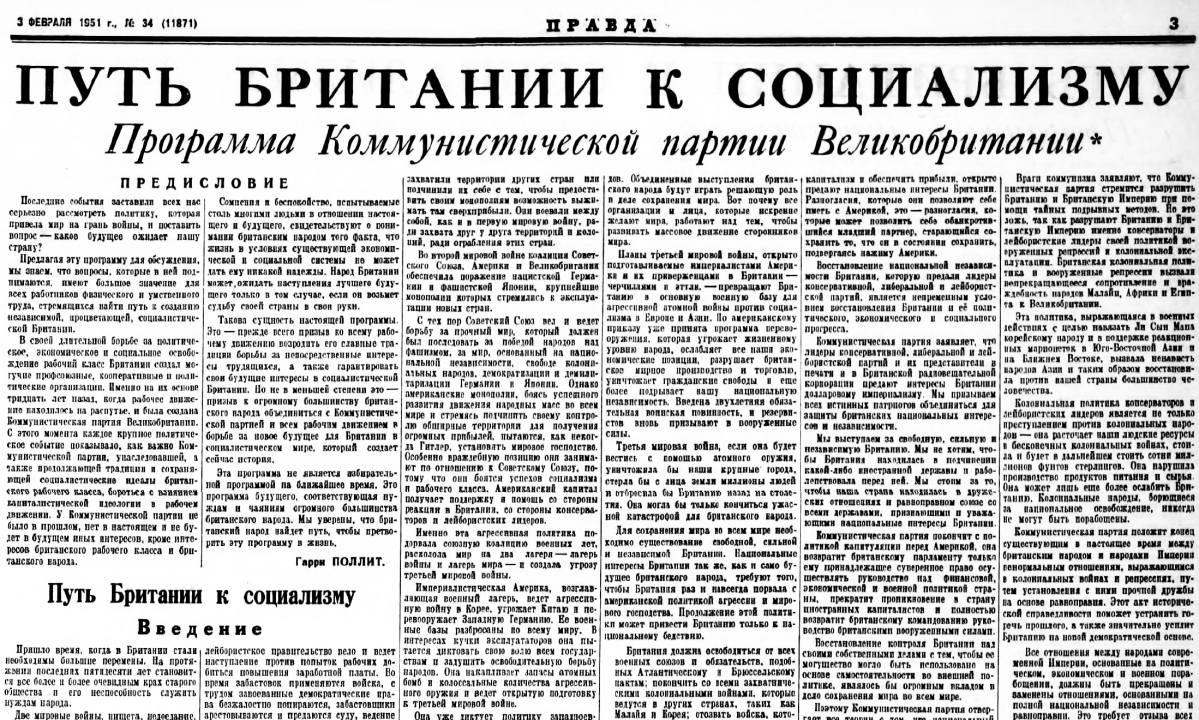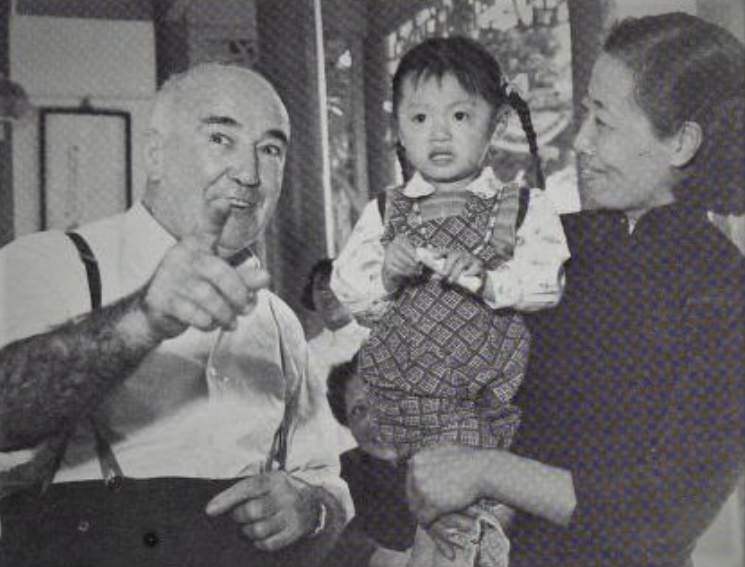It would be fair to say that the Communist Party of Great Britain’s (CPGB’s) 1951 programme, the British Road to Socialism (BRS), has had a very difficult history and reception, including its subsequent revisions in the CPGB and adoption by the 1988 Morning Star/Communist Party of Britain (CPB) split. Even the CPGB-PCC faction, which has no sympathy with either the BRS or any of its British or Soviet historical co-sponsors, failed to generate much external interest in a book-length critical analysis of the BRS back in 1991.[i] The CPGB-ML has recently embarked on a similar project to analyse the CPB’s Britain’s road to socialism that I suspect will also fall on stony ground.[ii] Some of this, of course, is due to factional rivalries but it is partly the result of the fact that the BRS was never enthusiastically adopted by the CPGB.
The BRS was simply imposed on the CPGB by its leadership in 1951 (as was subsequently admitted by Rajani Palme Dutt), after general secretary Harry Pollitt had taken the advice of Stalin in Moscow. Pollitt voiced his own doubts about how inspiring or otherwise the programme had been for his activists. In relation to the party’s 22nd congress in April 1952, in which the rank and file was given the dubious opportunity of rubber-stamping a programme adopted a year before, leadership figures quickly twigged that this had led to an absence of debate. Certain CPGB members such as Fred Westacott (in his Shaking the chains autobiography) have made claims about lively local meetings discussing the BRS in 1951 but there is precious little evidence to back this up.[iii]
The BRS always had a measure of unreality inside the CPGB. Members of The Leninist faction told me how the party’s pro-Soviet left in the 1960s and 1970s (i.e., they thought of the Soviet Union and the CPSU as morally upright revolutionary leaders of the world communist movement as against the British deviations of the CPGB) saw the BRS as a piece of silly reformist window dressing wheeled out during election time, with the real business of revolution being something that involved taking up arms and the use of force (I’ve heard oral reminiscences of this type from comrades in areas such as Luton, Hants and Dorset and Wales; and it’s a common theme in criticisms of the BRS of this era). There was extreme scepticism as to the likelihood, as imagined by the BRS, of the patriotic Labour left leading the struggle towards the first steps of socialism through parliament (an idea now in even more rapid retreat after Corbyn’s demise).
In the inner-CPGB parlance of its leadership in the 1950s, 1960s and 1970s, such people were dubbed ‘sectarians’ and hostile to the reformist project of the BRS. (Although, in fact, the leadership’s identification of ‘sectarian’ anti-Labour trends went back much further to the 1930s.) But the right-opportunist leadership was prepared to collude with the CPGB’s left because those elements were, at the very least, a large minority of the membership and, in some areas, most of the dues-paying activists. By the late 1960s even the Labour Monthly journal had started to exude certain themes dear to the CPGB’s left, albeit in very soft focus, after editor Palme Dutt went into opposition over the CPGB leadership’s unwillingness to back the Soviet invasion of Czechoslovakia. So, the leadership acted with caution and was forced to enlist the ideological support of its left around events such as the fallout in 1956 from Khrushchev’s secret speech and the Soviet invasion of Hungary. The leadership’s language was of a struggle against revisionism; for the leading role of the CPGB and the Soviet Union; and for democratic centralism (i.e., those concepts as they had been rendered under Stalin). Those on the party left went along with this and took up ideological cudgels with the leadership against its ‘revisionist’ critics. But re-stating the pre-eminence of the CPGB’s vanguard role could only but undermine the BRS, which was premised on the Labour Party leading Britain’s socialist revolution.
As late as 1964, one can find then CPGB general secretary John Gollan making obvious appeals to the inclinations of his party’s left wing (at that point containing both pro-Soviet and pro-Mao elements). He sets out a process of “socialist-communist united action” (socialist means Labour Party in this instance) focused on an anti-monopoly alliance inside and outside parliament. According to Gollan: “This, in British terms, is what the dictatorship of the proletariat means.”[iv] But dictatorship of the proletariat, as Gollan well knew, had an entirely different appeal to the CPGB left, based around the forcible suppression of the bourgeoisie and the more dramatic military events of the Russian Revolution. But Gollan almost makes the BRS a mere form of the proletarian dictatorship and this is partly the root of how the CPGB left treated the BRS as mere window dressing. There’s also a sub-theme here of what took place in Eastern Europe after the Second World War, when communist parties took power, at least in theory, under multi-party ‘people’s democracies’.
And the CPGB left wanted to believe that figures such as Pollitt, Dutt and Gollan were genuinely on the side of the angels and to make the ‘anti-revisionist’ canon as broad as possible. As Sid French, leader of Surrey CPGB and future New Communist Party leader, said in 1977: “Didn’t the party leadership in this country abandon the whole idea of the dictatorship of the proletariat in the first edition of the British road to socialism in 1951? Did they?… I don’t think they did but, if they did, they didn’t tell John Gollan who in [1964] was the general secretary of the party writing on behalf of the executive committee in a booklet called very appropriately Democracy and class struggle…” The left wanted to believe party leaders were ‘anti-revisionist’; and the party leadership wanted its left to believe it was ‘anti-revisionist’. So, the BRS was being undermined because of the CPGB having no true mechanism for dealing with factional struggle other than opportunist manoeuvre.
This spilled over into the Morning Star/CPB split’s adoption of the BRS, which it later renamed Britain’s road to socialism. The CPB’s history has been one of it making small groups of communists at least accept the BRS as a basis of action but nevertheless the historical record shows that several of its leading members (Rob Griffiths, Mary Davis and Andrew Murray, for example) cut their political teeth struggling against the method of the BRS, both in the old CPGB and the CPB.[v] More recently, there has been a palpable unease about Stalin’s role in overseeing the CPGB’s adoption of the BRS. This is a hard sell to some of the CPB’s broad-left constituency and the leadership does not want to oversell the virtues of Uncle Joe to its Young Communist League, which is much less uneasy about being associated with Stalin.
The Maoist movement is another that has an odd relationship with the BRS. Most Maoists have revered Stalin as a revolutionary icon and branded the BRS as a counter-revolutionary programme. Which became embarrassing as long ago as 1964 when Gollan told the world that the BRS had Stalin’s approval. More recently, Stalin’s correspondence with Pollitt on the matter has come to light.[vi] The CPGB-ML has been unable to face up to Stalin’s role here as it celebrates his general revolutionary probity in line with leader Harpal Brar’s origins in the Maoist movement. Its recent publication on the CPB’s Britain’s road makes no reference to Stalin’s involvement in the 1951 original. In private, Brar has apparently stated that he thinks the documents showing this are forgeries, despite their being uncovered and translated from the Russian State Archive of Social and Political History by Indian comrades supportive of Stalin’s legacy. The Indian comrades are not being blamed for this, but such tales of forgery are a fantasy to save CPGB-ML blushes.
Brar’s public position is much better. When speaking to CPB members 11 years ago, he said: “Our position on the subject is that we have no evidence to suggest that the BRS had the approval of the Communist Party of the Soviet Union and of Stalin but on the worst-possible assumption that it had such approval, our basic position is that the BRS is a wrong programme; it’s not a programme of revolution, it’s a programme of subjugation of the communist movement to social-democracy. That’s more important to me than whether it had the approval of Stalin or Saint Paul or Jesus Christ, it doesn’t really matter to me…”[vii] But comrade Brar’s “worst-possible assumption”, that Stalin did sponsor the BRS, is the truth. So, what does that mean for Stalin’s status as a revolutionary icon?
The BRS was the unloved bastard child of ‘official’ communism in Britain. Nothing screams that more clearly than the conflicted relationship supporters and opponents have had with it down the years.
[i] https://archive.cpgb.org.uk/assets/files/resources/Which%20Road.pdf
[ii] https://shop.thecommunists.org/product/britains-road-to-socialism/
[iii] For more on the non-debate around the BRS, see L Parker The kick inside: revolutionary opposition in the CPGB, 1945-1991 London 2012, pp35-36.
[iv] J Gollan Democracy and class struggle London 1964, p37.
[v] https://academic.oup.com/manchester-scholarship-online/book/16022/chapter-abstract/170998382?redirectedFrom=fulltext
[vi] https://www.marxists.org/history/erol/uk.postww2/stalin-pollitt.pdf
[vii] https://www.youtube.com/watch?v=ePsqU1AhlyY

